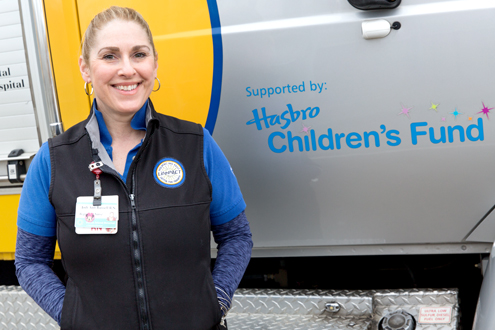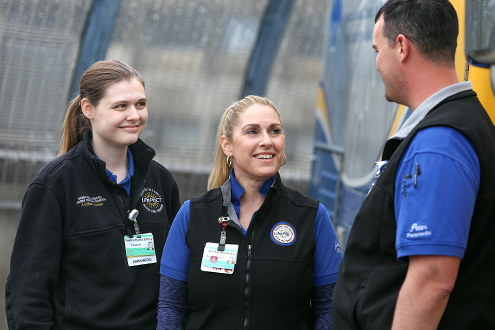Bringing the Hospital to Critically Ill Children
Transport team provides expertise, compassion to patients and families
The Hasbro Children’s Hospital LifePACT team is a vital resource to the region, providing immediate critical care services to children as they are transported from other health care facilities to Hasbro Children's Hospital for specialized pediatric care.

The LifePACT team includes paramedics, physicians and pediatric transport nurses. Pediatric transport is just one in a growing number of nursing specialties. These nurses receive training to provide care to newborns through adolescents with a wide-variety of conditions, from trauma to critical illness.
“The importance of having a pediatric-specific critical care transport is that…the LifePACT team has already been working in pediatrics and committed themselves to it,” said Nelson Pedro, NRP, the operations manager for LifePACT. “You need a pediatric team who has seen and cared for pediatric patients often.”
Started through a federal grant, LifePACT is Rhode Island Hospital and Hasbro Children’s Hospital’s critical care transport. LifePACT provides two ambulances, one for pediatrics and the other primarily for adult patients. Donated by Hasbro Inc., the pediatric ambulance was the first in the state to be designed specifically for children.
Such a unique program comes with its own set of unique challenges. Jodi Russell, RN, a pediatric transport nurse, has worked as a nurse for 30 years and worked on the transport team for more than 20 years.
“After we get a call and we’re on our way to a patient, we discuss the patient and the possible diagnosis,” said Russell. “And sometimes we get there and it turns out to be something completely different.”
The team must be specialized and trained to not only determine a child’s diagnosis, but to manage all types of patients and treat each accordingly.
For LifePACT, every call is different and every patient is different
The challenges the LifePACT staff face aren’t always related to health care. “Sometimes just the logistics of the ride is an issue and the travel times can take up to hours,” said Russell. “If you have a patient who needs to go to Boston, it’s hard to travel that long with only two people in the back of the ambulance.”
The team that staffs LifePACT can find themselves wearing several different hats in this role – health care provider, travel companion, and a source of support. “We encourage the family to come with their child. The family and child are kind of a whole entity and we try not to separate them,” said Russell. “We tell the parents what to expect and what will happen and the family appreciates that.”
As the LifePACT team knows, treating a patient is more than addressing the physical symptoms; emotional and mental well-being are vital to fully heal. In pediatrics, that means ensuring this well-being for both the patient and the family. “I think families appreciate that the hospital their child or family member is going to is able to come to their bedside,” Pedro said of the entire team. “I think they appreciate that the hospital has come to them. And we can give them insight that is specific to Hasbro Children’s Hospital – where to go, who to talk to, give them a number to call. It’s that one-on-one connection.”
“Even though we might know that their child is going to be okay, it’s still traumatic to the family and they’re scared. They’re putting their child in the hands of a stranger,” added Russell. “We do just as much reassuring of the parents as we do caring for the child.”

It takes a special person to become a nurse and a remarkable person to go beyond that role and become a source of assurance and comfort at a time when things can feel frightening and out of control. What drives a person to take on a one-of-a-kind role on the LifePACT team? “To be part of something that makes such a difference in a kid’s life is amazing,” said Russell. “You see kids grow up, graduate, have their own kids and you know you made that difference, that you were there when a family truly needed you.”
The lasting impact the LifePACT team can have on a child and a family can be illustrated in a story Russell tells.
Nearly twenty years ago, Russell and the transport team picked up and cared for an infant with respiratory distress and a breathing tube from a hospital. Years later, Russell would return to the same hospital to pick up another infant with a breathing tube. The grandmother of that child was in the room and upon seeing Russell said, “You took care of my child years ago from this same hospital and now here you are to take care of her own child.”
